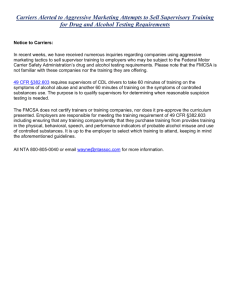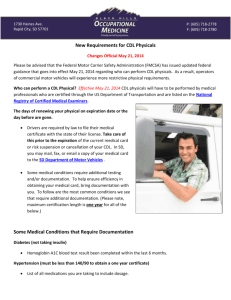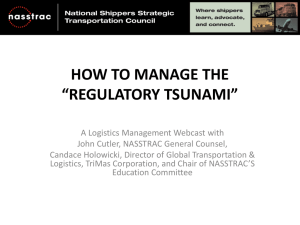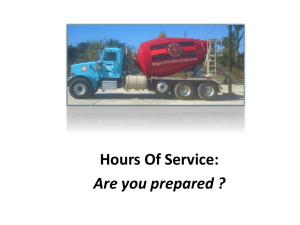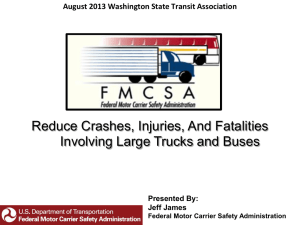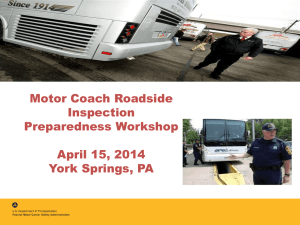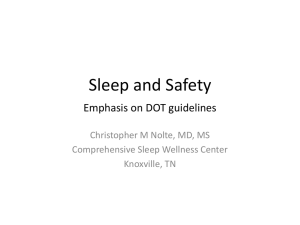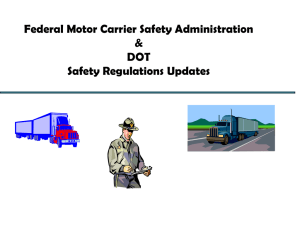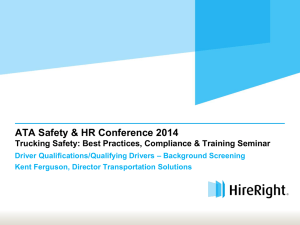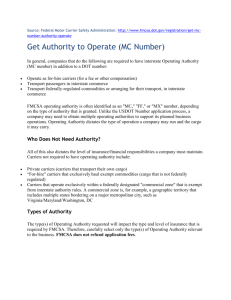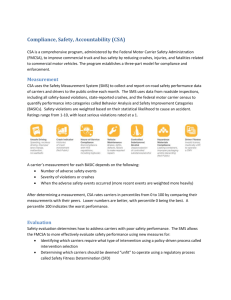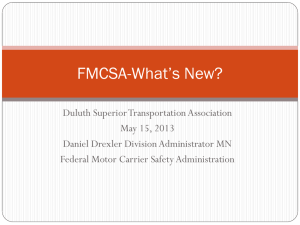FMCSA Regulatory Update
advertisement
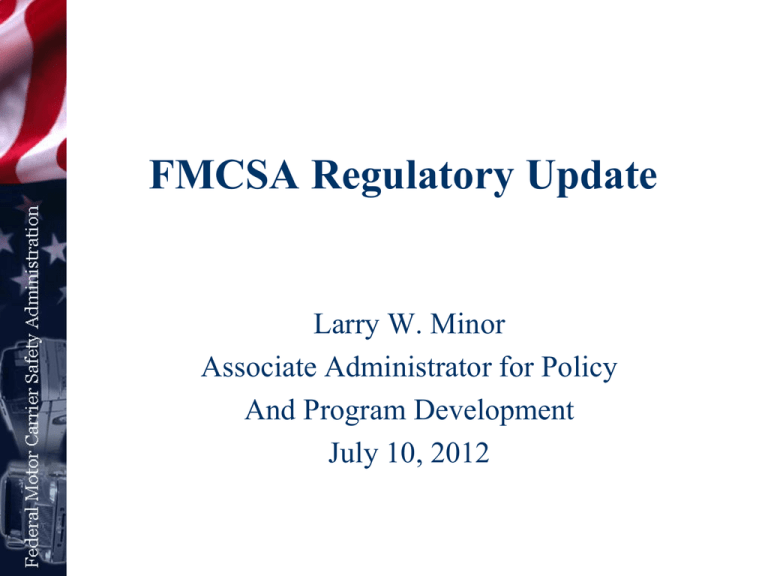
FMCSA Regulatory Update Larry W. Minor Associate Administrator for Policy And Program Development July 10, 2012 Distracted Driving – Cell Phones, Final Rule (December 2011) Final rule explicitly prohibits use of handheld cell phones by interstate truck and bus drivers. Handsfree phones are allowed; push-to-talk is allowed provided the driver does not have to hold the phone. The final rule provides penalties: – Driver disqualification penalties (60 days for 2nd offense within 3 years; 120 days for 3 or more offenses within 3 years) – CDL disqualification penalties (violations of State traffic laws concerning handheld cell phones) – Civil penalty of up to $2,750. National Registry of Certified Medical Examiners (NRCME) April 20, 2012 – Final rule to establish minimum training and testing requirements for all medical examiners who issue medical certificates for interstate truck and bus drivers. May 21, 2014 (Compliance date) – All medical cards issued on or after that date must be provided by examiners on the registry. Examiners must complete training course and testing, and submit medical certificate information to FMCSA on everyone who applies for a medical card. Eligibility for Medical Examiners Must be licensed, certified, or registered in accordance with applicable State laws and regulations to perform physical examinations Must complete a training program that meets FMCSA’s core curriculum requirements Must pass the medical examiner certification test provided by FMCSA and administered by a testing organization that meets FMCSA’s requirements. Complete refresher training every 5 years Complete recertification testing every 10 years Submit required monthly reports to FMCSA NRCME – II (NPRM, 2013) The proposed rule would encourage medical examiners to report medical certificate information to FMCSA more frequently than once per month. The rulemaking would also enable FMCSA to transmit the medical certificate information for interstate CDL holders to the State licensing agencies. Interstate CDL holders would no longer be required to submit their medical certificates to the States upon full implementation. http://www.nrcme.fmcsa.dot.gov Controlled Substances and Alcohol Testing Clearinghouse (NPRM, 2012) Require service providers to report positive test results to FMCSA’s clearinghouse. Motor carriers would be required to query the clearinghouse to ensure that CDL holders have not tested positive, or have completed the requirements following a positive test result: – SAP recommendations; – Return-to-duty tests; – Follow-up tests. Unified Registration System (Final Rule, 2012) This rulemaking would establish a single, on-line process for: – Motor carrier identification report (MCS-150) – Application for operating authority (OP-1) – Designation of Process Agent (BMC-3) Passenger carriers, property carriers, freight forwarders, brokers Patterns of Safety Violations (NPRM, 2012) The rule would enable FMCSA to suspend or revoke the operating authority of a carrier based on the conduct of company officers. Carriers could be subject to suspension or revocation if they have an officer that has engaged in patterns of violations or covering up violations at the current company, or a previous motor carrier. The Agency would establish rules of practice to ensure the rule is applied in a fair manner – estimated small population of individuals. Safety Fitness Determination (SFD) (NPRM, 2012) Replace the current rating system (Satisfactory, Condition, Unsatisfactory/Unfit) based on the compliance review (CR) and ratings factors. New safety fitness based on the Compliance, Safety Accountability (CSA) program, looking at inspection, crash and investigation data to make the proposed safety fitness determination. Separate the full on-site CR from the fitness determination. Electronic On-Board Recorders (SNPRM, 2013) Rulemaking would: – Require use of EOBRs by carriers using paper records of duty status (RODS). – Establish technical specifications for EOBRs: automatic date, time and location when there are changes in duty status; file format; tamper resistance, etc. – Hours-of-Service Supporting Documents; – Explain how the Agency will address the statutory requirement to prevent the use of EOBRs to harass drivers. QUESTIONS
